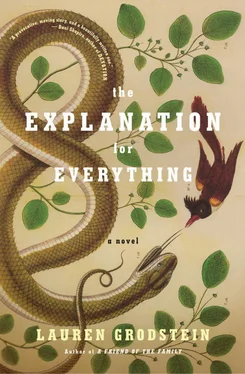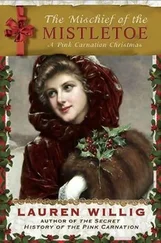“Then what gives you meaning?”
There was some pabulum for this, something about nature being enough of a miracle, or about how life itself contained meaning, but Andy forgot what the script was. He had been focusing on the tiniest substructures in mouse brains for hours now, and there was pain between his eyes, and in his back.
“Without God,” Lionel said, “all we have is a materialistic view of the world where there’s no morality, no good and bad. Everything’s random, therefore nothing matters. That’s where existentialism comes in.”
“You know, Lionel, there’s a strong argument to be made that morality evolved right alongside physical characteristics,” Andy said. “You can see protomorality, or at least a sense of compassion, even in toddlers who are too young to know religion. Even in animals.”
Lionel nodded. “Of course you can, because God created us all. Even the animals.”
“Yes, but—”
“And I hate to point out,” Lionel said, “that dictators like Hitler and Stalin used evolution to support their genocides.”
“Oh, come on, Lionel,” Andy said, pinching the bridge of his nose to wipe out the incipient headache. “Let’s not bring those two into this.”
“It’s true. Mein Kampf is all about evolution. Hitler believed that the most evolved races, which in his mind meant Aryans, had the right to exterminate the less evolved, which in his mind meant the Jews, the gypsies, the handicapped. You know, everyone else.” Lionel’s owlish eyes bugged out a little when he soliloquized. “But if you’re a Darwinian evolutionist, this should only seem natural, right? I mean, isn’t that what evolution does? Separate the strong from the weak? The more evolved from the less evolved?”
“No, it’s not.”
“It totally is,” Lionel said. “And Stalin thought the same thing, which is why he exterminated native peoples from Azerbaijan to Siberia. Stalin is responsible for more deaths than even Hitler is. Which is a lot of deaths we can attribute to Darwinian evolution. But, you know, whatever, Professor. Teach what you need to teach, like it doesn’t matter.”
Oh, God. “Lionel, you can’t just slap the words Hitler and Stalin onto something you don’t agree with and call it a reasoned debate.”
“So let’s take Hitler out of it,” Lionel said. “Let’s remove Stalin and Hitler and still think about a world where we’ve agreed in survival of the fittest. The strong vanquishing the weak. What have we got then?”
“Again, Lionel, I think you’re deliberately misunderstanding the nature of Darwinian evolution.”
“No more welfare, no more public health care, no more hate crime legislation, since what is a hate crime if not a crime of the strong against the less strong? You like that world, Professor? You want to live in that world?”
“Lionel, enough.”
But the kid was on a roll. “Morality, human obligation toward one another, comes from the idea that life has purpose. Evolution takes away that purpose. It makes everything an accident. Everything becomes random. It takes away the necessity for humans to look out for one another.”
“That’s not true,” Andy said, as Rosemary gave him a worried look from down the hall. “Darwinian evolution is not the same as social Darwinism. Social Darwinism is this ugly thing that people use to justify the mistreatment of others. Darwinian evolution is the simple idea that life forms have changed in a variety of ways in response to the environment.”
“And what happens to those that don’t change successfully?”
“What do you mean?”
“I mean, according to Darwinian evolution, what happens to those forms of life that don’t change in response to their environment? Or that don’t change very well?”
“What do you mean, don’t change very well?”
“They die out,” said Lionel. “That’s what happens. They die.”
As though this meant more than it did—as though species didn’t go extinct all the time, as though everything that was born didn’t eventually die.
“Do you still talk to Hank Rosenblum?” Lionel asked.
“I’m sorry?” Andy said. His relationship with Rosenblum—his former relationship—was one he tried to keep to himself.
“He thanked you in one of his books,” Lionel said.
“You’ve read Rosenblum?”
“I’m taking your class for the second time, Professor,” Lionel said. “Of course I’ve read him.”
“Right, but I mean you read Religion’s Dangerous Lie ?”
Lionel nodded. “And I have to say,” and here he started to lose his Hitler-and-Stalin cool, “I have to say that when I think about that poor girl Rosenblum murdered, and I think about the fact that this is a man who’s on our syllabus, and then I think that you just keep teaching it — that’s when I start to see my sister’s point a little, that really nothing matters. That I’m a fool for trying to make the world a better place. That I should just go to class and nod my head and become a machine —”
“Lionel—”
“That you should just go out in the world and know that when you die you’re just dead, that’s it, there’s no God, there’s no nothing.” He wiped his eyes with the back of his wrists.
“Lionel, stop.”
“That you can just murder someone—”
“Okay, enough. Nobody was murdered. Rosenblum didn’t murder anybody.”
“I read the news reports online.”
“Then you should know Rosenblum was never accused of murder,” Andy said, and those feelings that he had pushed away—he had a new baby, he was trying to find an academic position, and Jesus, Hank, what was wrong with you? how could you have done that?—came back, gurgled in him. “Nobody was murdered.” And then, to calm him down, or just to change the subject, he said, “You know, I’m doing that independent study.”
Lionel took a moment to collect himself. “What are you talking about?”
“With your friend… your friend…” God, how had he become so terrible with names? “With that friend you sent me.”
“Oh, Melissa.” Lionel sighed. “She’s not really my friend—I met her at a Campus Crusade meeting. I think she’s a transfer student. She wanted to do—”
“Intelligent design, I know.”
“And you said yes?” Here Lionel allowed himself a small smile. His face was mottled. Andy thought that his sister should be proud of him. He also thought about the bitter way Lionel spit out that line: when you die you’re just dead.
“I thought it might be interesting.”
“You just want to change her mind.”
“So?” Andy said. “You just want to change mine.”
“Yeah, but you have a position of power,” Lionel said. “Who am I? Who is Melissa? How are we supposed to confront people like you, like Rosenblum—”
“All right. Enough with the self-pity,” Andy said. He stood, wiped his jeans, motioned for Lionel to stand up too. “You’re young, you’re healthy, you have a voice. I’m middle-aged and exhausted. Rosenblum is in hiding on Long Island. From an evolutionary standpoint, it’s you who has the power, not me. So stop feeling sorry for yourself. If you’ve got something to say, say it. Don’t cry in my hallway.”
Lionel hung his head.
“And really, kid, stand up straight.” Andy felt, oddly, refreshed by this interaction, a chance to buck up poor Lionel Shell, with the existentialist sister and the fear of death that crouched around all of them, even the young.
“Okay,” Lionel said. “But can I ask you one question—you know that book Rosenblum thanked you in? Religion’s Dangerous Lie ?”
Читать дальше












